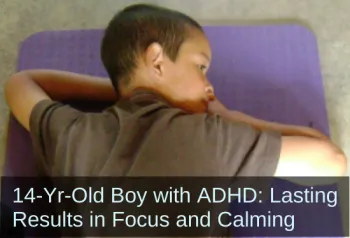Primitive Reflex Integration Case Studies
Focus and Calm Improve Homework, Learning, and Daily Tasks for Teen
Help for learning, sleep issues, anxiety, and more.
This teenager was struggling with emotional regulation and focus. Read about his tremendous positive results using movements from the Brain and Sensory Foundations, First Level course. This boy's mother happily reported: "We found the exercises to have immediate and lasting results, especially for focus and calming."
Submitted by Laurie Bernstein OTR/L

| Before | After |
|---|---|
| Difficulty reading | Reading fluency noticeably increased |
| Required 30-60 minutes of "self-talk" in order to fall asleep | Falls asleep quickly |
| Could not complete homework on his own | Able to complete his lessons by himself with good focus |
| Would complain about schoolwork | Complaints about schoolwork decreasing |
| Could not maintain sustained conversation | Now able to carry on a reciprocal conversation with his friends |
| Aversion to trying new foods | Has voluntarily asked to try two new foods |
Mark is our 14 year old son who has a diagnosis of ASD and ADHD. I have been homeschooling him since the third grade, and because I'm an OT, I have been able to implement sensory integration, self-regulation, and fine motor strategies into our school days. He has also been receiving speech therapy services for many years. As parents, our main concerns for him were regarding his emotional regulation and focus for doing difficult tasks such as school work and chores, his impulsivity, and his inability to engage in sustained conversations with his peers.
We began doing a home program of the rhythmic movements [from the Brain and Sensory Foundations course] to settle his nervous system and to establish a good foundation to reintegrate his retained reflexes. We did the movements 5-6 times/week for 2 weeks. I was amazed at how quickly we saw improvements. After the first session, his reading fluency noticeably increased and he fell asleep quickly that night without the usual "self-talk" he would do for 30-60 minutes in bed each night.
After the second week, he was able to complete his lessons by himself with good focus. Also, his complaining about schoolwork was decreasing and our days were becoming easier.
During week 3, I began integrating his reflexes [from the Brain and Sensory Foundations course]. After testing, I found that he had retained most of his primitive reflexes. I decided to focus first on integrating the TLR [Tonic Labyrinthine Reflex] in order to progress the STNR [Symmetrical Tonic Neck Reflex]. I also began doing the exercises for Moro reflex and incorporated the FPR techniques with him to work on his self-regulation needs and tendency towards worry. I implemented the 5-Step Balance Process with him a few times also.
By week 6, I noted he had good neck extension and was able to have calm starts to his school days. His ability to compose an essay was much easier than before with no emotional outbursts, lots of good ideas and he was able to put his thoughts together in a cohesive way. He is also now able to carry on a reciprocal conversation with his friends.
He has always had an aversion to trying new foods, but by week 8 he voluntarily asked to try 2 new foods! He now eats a few food items he would not have in the past.
We are now in week 11 and he has fully integrated his TLR and ATNR [Asymmetrical Tonic Neck Reflex]. We found the exercises to have immediate and lasting results, especially for focus and calming. We continue to work on the other reflexes and look forward to seeing his continued progress.
(Edited, emphasis added)
*Disclaimer: The activities in the Brain and Sensory Foundations curriculum make use of the natural processes of neuroplasticity and development that are innately wired in the design of human beings to promote maturity and function. These activities appear to calm, organize, and mature the neuro-sensory-motor systems just as we see in the healthy development of human infants. Individual results may vary, and we do not claim to offer a diagnosis or cure for any specific condition or disorder. The Brain and Sensory Foundations activities appear to improve overall functioning resulting in measurable improvements for a range of conditions as demonstrated in over 1800 case studies from participants.

